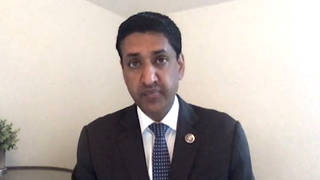
Guests
- Darrick Hamiltonfounding director of the Institute on Race, Power and Political Economy at The New School, where he is also a professor of economics and urban policy.
Democrats in Washington remain divided over two key bills at the center of President Biden’s domestic agenda: a $1 trillion bipartisan infrastructure bill and the $1.85 trillion Build Back Better plan, which has been cut down from $3.5 trillion. Even though Biden’s latest framework is almost half the size of the original proposal, conservative Democratic Senators Joe Manchin of West Virginia and Kyrsten Sinema of Arizona are still refusing to commit to its passage. The new proposal strips out several key provisions, including paid family leave, free community college, expanded Medicare coverage for dental and vision, and prescription drug reform. Key elements still in the framework include provisions to provide universal pre-K education, an expanded child tax credit for another year, affordable child care, affordable housing, free school meals, expanded Medicare for hearing services, as well as $555 billion in climate initiatives. Economist Darrick Hamilton, founding director of the Institute on Race, Power and Political Economy at The New School, says that despite the smaller size of the package, it would still transform the U.S. economy after decades of austerity and budget cuts. “This is a pivotal change,” he says.
Transcript
AMY GOODMAN: Democrats remain deeply divided over two key bills at the center of President Biden’s domestic agenda: the now $1.85 trillion Build Back Better plan and a smaller more than $1 trillion bipartisan infrastructure bill. House Speaker Nancy Pelosi was forced to postpone a vote Thursday on the infrastructure bill after progressive Democrats demanded again that both bills be considered in tandem. In a statement, Congressmember Pramila Jayapal, the chair of the Congressional Progressive Caucus, said, quote, “There is too much at stake for working families and our communities to settle for something that can be later misunderstood, amended or abandoned altogether,” she said.
Earlier in the day, President Biden addressed the nation, outlining what he described as an historic economic framework.
PRESIDENT JOE BIDEN: It’s a framework that will create millions of jobs, grow the economy, invest in our nation and our people, turn the climate crisis into an opportunity, and put us on a path not only to compete, but to win the economic competition for the 21st century against China and every other major country in the world. It’s fiscally responsible. It’s fully paid for. … This framework includes historic investments in our nation and in our people. Any single element of this framework would fundamentally be viewed as a fundamental change in America. Taken together, they’re truly consequential.
AMY GOODMAN: Even though Biden’s framework is almost half the size of the original $3.5 trillion proposal, two key conservative Democratic senators — Joe Manchin of West Virginia and Kyrsten Sinema of Arizona — have refused so far to commit to supporting it. The new framework strips out several key provisions, including paid family leave, free community college, expanded Medicare coverage for dental and vision, as well as prescription drug reform, which would save billions of dollars. Key elements still in the framework include provisions to provide universal pre-K, expanded child tax credit for another year, affordable child care, affordable housing, free school meals, and expanded Medicare for hearing services. The framework also includes over a half a trillion dollars for climate initiatives, which Biden highlighted Thursday.
PRESIDENT JOE BIDEN: This framework also makes the most significant investment to deal with the climate crisis ever, ever happened, beyond any other advanced nation in the world. Over a billion metric tons of emission reductions — at least 10 times bigger on climate than any bill that has ever passed before and enough to position us for a 50 to 52% emission reductions by the year 2030. And we’ll do it in ways that grow the domestic industries, create good-paying union jobs, address long-standing environmental injustices, as well.
AMY GOODMAN: President Biden speaking Thursday before he flew to Europe, where he’s meeting with the pope today, then will attend the G20 summit in Rome and the U.N. climate summit in Glasgow on Monday.
We’re joined now by Darrick Hamilton, founding director of the Institute on Race, Power and Political Economy at The New School, also a Henry Cohen professor of economics and urban policy. He was a surrogate and economic adviser to Bernie Sanders’ 2020 presidential campaign, also one of Sanders’ appointee members to the Biden-Sanders joint task force.
Welcome back to Democracy Now!, Professor Hamilton. Can you lay out this moment, what we are looking at? Again, a deadline was set by the Democrats to vote on the bipartisan bill yesterday, but progressive congressmembers balked, saying they always said both bills would have to be voted on in tandem — the infrastructure bill and the Build Back Better plan, which is Biden’s agenda. Talk about what’s in and what’s out, and give us the economic story behind it.
DARRICK HAMILTON: Well, you know, we are at a pivotal moment. And I’m glad that the Progressive Caucus is holding a line in ensuring that certain things get passed in this legislation. The word “compromise,” we’ve seen it in the past, where far too often we’ve compromised too much. In fact, I don’t even — I prefer not even to use that word. I guess “strategy” is what we have to do in this moment.
But, you know, start with the good news. The good news is that if we put this bill in context of the last 40 years, this is a pivotal change from the ways in which government has engaged in ensuring that people have adequacy in which they engage. And we could talk about specifics — I mean, addressing our climate. You know, we could talk about other specifics. We could talk about — what else? What else is in the bill? Child tax credit. You know, it should be known that this is the 25th year anniversary of welfare reform. And if you juxtapose welfare reform, where we became punitive in how we dealt with poverty, with all these conditions in order to receive basic needs, with the child tax credit, that is a narrative change, and that is a change in which government engages with people, ensuring that they have resources so that they can have agency in their lives, make choices that’s important for them.
AMY GOODMAN: I mean, what’s amazing is how overwhelmingly popular, even among Republicans around the country, some of the programs are that were cut out — for example, the expansion of Medicare for hearing services, very popular, but also for dental and for vision, extremely popular, but that’s cut out.
DARRICK HAMILTON: Yeah, and you’re right. And this is — the economics of this can’t be separable from the politics of this. When you have two, as you characterize accurately, conservative Democratic senators being able to stop this from going forward, that’s a problem. And what’s more, if we think about the other side of the aisle, I mean, what is clear is that even with something like a fascist coup attempt of January 6, when they’re obstructing that investigation, they clearly aren’t partners in trying to generate what’s good for the American people. So the politics are problematic, even when the masses of Americans recognize the benefits of something as simple as Medicare providing hearing coverage for seniors.
AMY GOODMAN: So, what about the latest on Medicare drug price negotiations? The CBO estimates over $450 billion in 10 years savings from the Medicare drug price negotiation provision, but this Medicare prescription drug reform is out.
DARRICK HAMILTON: Yeah. And, you know, again, this is commonsense, obvious policy in that it’s cost-saving for the American government and it brings something positive to the American people, but yet the stench of politics are interfering with our ability to move it forth. There’s no question the lobbying that’s going on right now to prevent that provision from the drug companies.
AMY GOODMAN: Paid family leave. It was Senator Manchin, the largest recipient of oil, gas, coal money in Congress, who says no to a person having paid family leave. That means a person gives birth on a Sunday night, and if they don’t have money, they’re expected to work on Monday morning if they can’t afford unpaid leave. Originally, the proposal was 12 weeks paid. That was reduced to four weeks, now none.
DARRICK HAMILTON: Yeah, it’s inhumane. It’s inhumane in favor of corporations. But, you know, Amy, we could also talk about — again, we’re talking about, if we put this in context, a narrative change. And I do want to give your audience some of the positive. We talk about the taxes that are being used to pay for this bill, which is another framing I don’t like, either, because America certainly has enough resources to not only do paid sick leave, but really begin to at least redress our climate crises.
But what I like about these taxes, the taxes tilted towards the wealthy Americans, is that it’s redressing plutocracy. The problem is not that we need those resources to pay for the things we need; it is that class of individual has too much resources so that they can do things like obstruct our ability to provide hearing through Medicare, to address our environmental crisis and to provide all Americans with the dignity of paid family leave, as well as paid medical leave. We need to get that immoral money out of politics. The fact that you have the hands of special interests being able to coopt our political process in ways to stop our economic agenda, that’s also a problem. And, you know, at least implicitly, this bill has some measures to begin to redress that.
AMY GOODMAN: Right now women on social media are sharing images of their babies at four weeks as a way to emphasize how hard it is to go back to work at that point. That was when they had reduced it from 12 to four. Now it’s at nothing.
DARRICK HAMILTON: Yeah, it’s shameful. You know, there really is nothing more to say than it’s shameful. And again, if we put this in international comparisons, every other country with income levels that are similar to that of America has paid family leave. So, why aren’t we being able to do it? Well, to me, the answer is clear: The special interests being able to lobby our government corrupts it. It corrupts our government and keeps us from being able to do what is obviously good policy.
AMY GOODMAN: So, let’s talk about the climate, what’s included and what isn’t. And we’re talking about two different bills. Now, there are a number of progressives who are saying, even with this pared-down Build Back Better Act, they are willing to support it if it is voted on in tandem with the so-called bipartisan bill, but Manchin and Sinema have not even agreed that if the bipartisan bill is voted on, that they will vote for the Build Back Better Act.
DARRICK HAMILTON: Which is why I like the Progressive Caucus also coming back with a strategic notion of “We’re not just going to just roll over. We want some assurance, even if we’re going to get this compromise bill, this at least beginning first step to start moving the government to redress our climate crises.” I mean, another aspect of it, Amy, is that the bill is largely incentives, is largely directed at trying to incentivize corporations — utilities, in particular — to behave better with regards to clean energy and better technologies to redress our climate issue.
AMY GOODMAN: Well, let’s talk about that, the Build Back Better Act having something like $555 billion, half a trillion dollars, for climate policies like tax credits encouraging electric vehicles, solar panels, wind turbines and more energy-efficient buildings.
DARRICK HAMILTON: Yeah. I mean, the incentives are useful, but we obviously need to do more. We need to have public options. We need a government that’s engaged in making sure our economy is green and directly providing those energy sources. Not only will that ensure that it gets done, but who will own those assets? The public will own the those assets. So, in addition to these incentives, we have a long way to go. We know that $550 billion is clearly not enough. But I still want to emphasize the positive, which is, if we compare this in a historical context, this really is transformative. And the other element is, we got here because people have agitated and got us to this point. So, at the end of the day, the power still rests with people. And I would consider this as an opening, but we still have a long way to go.
AMY GOODMAN: Well, Darrick Hamilton, I want to thank you so much for being with us, founding director of the Institute on Race, Power and Political Economy at The New School, also the Henry Cohen professor of economics and urban policy there.
And for folks, tune in for our coverage for the next two weeks of the U.N. climate summit in Glasgow. We’ll be bringing you news from inside the summit, the protests outside, and hear from people all around the world who couldn’t go to Glasgow but who are fighting on the ground to deal with the climate emergency.
Next up, we look at new revelations about shadow police units inside Border Patrol. And then, what does the late great Nobel Prize-winning novelist Toni Morrison have to do with the current Virginia governor’s race? We’ll talk about that. Stay with us.












Media Options